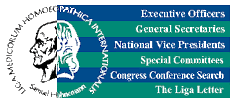Friday, January 9, 2009
How Homeopathy Was Founded
How Homeopathy Was Discovered
18th century belongs to Dr Samuel hahnemann, father of Homeopathy. Hahnemann even as a child, showed great proficiency in languages. He obtained his medical degrees from University of Leipzig, Vienna and Erlangen. He soon grew to be highly respected, but the systems of medicine prevalent at that time, like bloodletting, cathartic, leeches and use of toxic chemicals, greatly disturbed him.
When Austria's King Kaiser 11 and other well known personalities died due to these treatments, Hahnemann rebelled and gave up his flourishing practice saying 'I shall not kill if I cannot cure" and preferred to be poor for upholding this principle.
Law of Similarity
Hahnemann took up the job of translator, translating medical books from English to German to eke out a living, which earned him enough to look after his large family.
It is while translating Cullen's Materia Medica, he hit upon an idea which led to his revolutionary discovery of Homeopathy. In Cullen's book, it is said that 'Chinchona Bark' or 'quinine' can cure malaria fever.
Hahnemann was not quite convinced with this explaination and decided to test the drug on himself. To his suprise, he found that he developed typical symptoms of malaria which vanished when he stopped taking the drug.
He repeated his experiment with other drugs and found out the same result. He wondered if ' the drug could produce typical symptoms in a healthy person and cure a patient with the same symptoms ?
He repeated this proving for 6 years and recorded his research and observation in detail and propounded the doctrine of ' Similar Similibus Curentur' or let likes be trated by likes or in Malay 'Persamaan dan Persamaan Menyembuahkan' atau 'keserasian'
Yes, Hahnemann tried out his law of similarity in clinical cases and found out to be very effective.
Law of Potentisation
Another observation Hahnemann made was that when several medicines were given in such concentrated doses, that they proved to be afatal at times. Son he began diluting into micro doses of drugs. The more dilute the medicine, the more potent it became !
These dilutions with minute amount of active compound were capable of producing unimaginable physical and mental changes in humans, changes that had not been noticed before ! At the same time, there were no harmful side effects and very often obviated even the need for surgery. Thus by 'diluting' which he termed succussion, he propounded the Law of potentisation.
The law of Similars and the Law of Potentisation are the two unique features of homeopathy.
Thus we can say that homeopathy was established as a system of medicine - simple, nonviolent, truly human, natural and friendly.
18th century belongs to Dr Samuel hahnemann, father of Homeopathy. Hahnemann even as a child, showed great proficiency in languages. He obtained his medical degrees from University of Leipzig, Vienna and Erlangen. He soon grew to be highly respected, but the systems of medicine prevalent at that time, like bloodletting, cathartic, leeches and use of toxic chemicals, greatly disturbed him.
When Austria's King Kaiser 11 and other well known personalities died due to these treatments, Hahnemann rebelled and gave up his flourishing practice saying 'I shall not kill if I cannot cure" and preferred to be poor for upholding this principle.
Law of Similarity
Hahnemann took up the job of translator, translating medical books from English to German to eke out a living, which earned him enough to look after his large family.
It is while translating Cullen's Materia Medica, he hit upon an idea which led to his revolutionary discovery of Homeopathy. In Cullen's book, it is said that 'Chinchona Bark' or 'quinine' can cure malaria fever.
Hahnemann was not quite convinced with this explaination and decided to test the drug on himself. To his suprise, he found that he developed typical symptoms of malaria which vanished when he stopped taking the drug.
He repeated his experiment with other drugs and found out the same result. He wondered if ' the drug could produce typical symptoms in a healthy person and cure a patient with the same symptoms ?
He repeated this proving for 6 years and recorded his research and observation in detail and propounded the doctrine of ' Similar Similibus Curentur' or let likes be trated by likes or in Malay 'Persamaan dan Persamaan Menyembuahkan' atau 'keserasian'
Yes, Hahnemann tried out his law of similarity in clinical cases and found out to be very effective.
Law of Potentisation
Another observation Hahnemann made was that when several medicines were given in such concentrated doses, that they proved to be afatal at times. Son he began diluting into micro doses of drugs. The more dilute the medicine, the more potent it became !
These dilutions with minute amount of active compound were capable of producing unimaginable physical and mental changes in humans, changes that had not been noticed before ! At the same time, there were no harmful side effects and very often obviated even the need for surgery. Thus by 'diluting' which he termed succussion, he propounded the Law of potentisation.
The law of Similars and the Law of Potentisation are the two unique features of homeopathy.
Thus we can say that homeopathy was established as a system of medicine - simple, nonviolent, truly human, natural and friendly.
Subscribe to:
Post Comments (Atom)















No comments:
Post a Comment